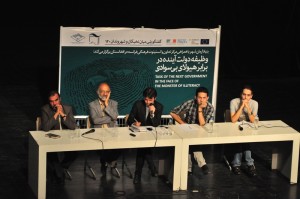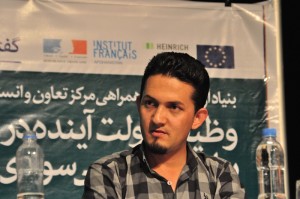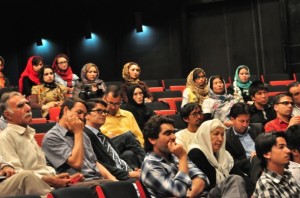Armanshahr Foundation’s 120th (year VII) GOFTEGU public debate, a bridge between the elite and the citizens, was held in collaboration with Cooperation Center for Afghanistan at the French Institute of Afghanistan on 29th August 2013 with the title of “TASK OF THE NEXT GOVERNMENT IN THE FACE OF THE MONSTER OF ILLITERACY”.

Mr. Jawad Darwaziyan, moderator of the meeting, welcomed the participants and spoke of the fundamental role of literacy in the advancement of a society: “Without paying attention to education, there shall be no fruitful change.” He recalled the similar topics of several public meetings of Armanshahr Foundation in the past few years and said it was essential to analyse two fundamental questions: 1. Why are there so many illiterate people in Afghanistan? 2. Why has the government not taken action to eliminate illiteracy, where illiteracy is one of the most important problems of our society?
He also called on the speakers to discuss the future of the illiteracy crisis and offer tangible, realistic and accessible solutions to reduce and eliminate illiteracy.
Mr Rooholamin Amini, deputy director of Armanshahr Foundation, thanked the participants for attending and spoke about seven years of cooperation and friendly relations between Armanshahr Foundation and the French Institute of Afghanistan. He also expressed gratitude to the FIA deputy director Ms Guilda Shahverdi whose term of office was about to end and presented her with a collection of Armanshahr books for her three-year cultural and social activities.
The first speaker, Dr Sayed Askar Mousavi, Senior Associate Member at Oxford University, argued that fighting illiteracy was linked to other issues such as identity challenge, cultural crisis, nation-building process and good governance. In his opinion, the monsters are the illiterate elite who use the fight against illiteracy to pursue certain agendas with economic purposes and misuse of political power. The domain of education is different from training and the latter is one of the most significant and fundamental infrastructural characteristics of the modern society. Expressing regret about the present conditions of education in Afghanistan, he concluded that the biggest deterrent preventing the elimination of illiteracy and realisation of the modern society is the collective refusal to accept healthy and systematic training.
Mr Sadiqullah Towhidi, director of Media Watch, discussed the role of the media in enhancing a national policy to fight illiteracy from different angles. The most important factor for the failure of most modern nation-building projects is the absence of coherence between the Western plans and the national will, said Mr Tohidi. The media have a very fundamental role to play in the national development process, but their influence is very little as a result of the totally economically motivated will in media behaviour.
Mr Towhidi concluded: Despite the flow of huge sums of money into the country, there is no specific plan to eliminate illiteracy and to specify the status of the media in this context. There is no media development in Afghanistan but media explosion. Neither the Afghanistan government nor the international community has been interested in eliminating illiteracy. The Afghanistan government has just started working on an anti-illiteracy plan after 11 years. The media were not interested in fighting illiteracy and the Afghanistan government failed to encourage any media that took action to promote education.
Mr Mujib Mehrdad, writer and poet, discussed the roots of illiteracy and the significance of the fight against illiteracy. He said: Literacy has no doubt a direct correlation with political, cultural, social and economic stability. The government is the only important actor in fighting illiteracy. However, the present government is one of the least cultured governments in the past 45 years. Cultural policy should pursue a balanced development, specific education for the weak, ethnic and religious minorities and others. In Afghanistan, however, the state and non-governmental institutions are incapable of cultural development for various reasons. One of the important characteristics of the crisis-ridden societies is achieving power and hanging on to it.
The second part of the meeting was specified for questions and answers. Atiq Arvand, the discussant of the meeting, outlined the historical breaks in Afghanistan since 1880 and distinguishing between two political and social approaches to historical criticism, asked Mr Tohidi to address the social contexts of illiteracy.
Mr Towhidi said that political outlook in historical criticism is much more important than social outlook in Afghanistan. All social developments are geared towards political changes and the struggle to achieve power.
Next, Atiq Arvand examined two historical eras when reforms emerged and declined. The first began with the taking of power by Emir Shir Ali Khan and his superficial reforms, which ended by the Young Afghans Movement under Amanullah Khan. The second began with reforms under Hashim Khan and Mahmoud Khan and systematic Communist programmes under Karmel and Taraki, which ended upon the taking of power by the Mujahedin and the Taleban. He asked Mr Mousavi: what is your opinion of the temporary and shaky plans of ethnic political powers in Afghanistan?
Mr Mousavi replied: I have a problem with your understanding of history and therefore do not have an answer to your question.
Then, Mr Arvand examined the role of dictatorial systems in Asian countries such as Iran under Reza Khan and Turkey under Ataturk in promoting literacy and combating illiteracy and asked Mr Mousavi: What do you think of the dictatorial powers in Afghanistan? Why did the plans by the authoritarian rulers in Afghanistan fail to modernise knowledge?
Mr Mousavi replied: In countries like Turkey on the ruins of the Ottoman Empire and Iran, which enjoyed very rich social and cultural backgrounds, modernisation was achieved much easier and calmer than in a sick country like Afghanistan. Indeed, in Afghanistan we never had dictators in the real sense of the word. We only saw hostile groups that ranted against all modern values and concepts.
A participant asked Messrs Mousavi and Mehrdad: You only spoke about the problems and shortcomings in the system; but it was not made clear what the main reasons for those problems are and what your solutions are for them.
Mr Mousavi replied: Fifty percent of the solution to a problem is asking the question and challenging it. We need to know the problems first. It is not possible to solve them if we pass by them.





